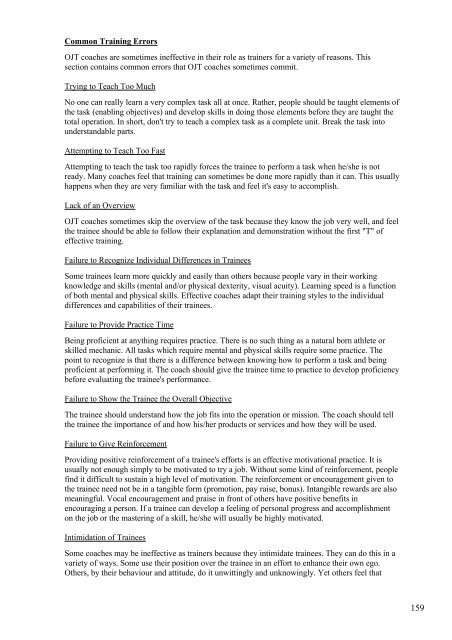How to Perform On-the-job Training - Dean Amory
According to The Encyclopedia of Business, ©2000 Gale Cengage, On-the-job training is by far the predominant form of job training. Studies also indicate that it is the most effective form of job training. Yet, it also represents a significant investment considering that roughly 30% of a new worker's time is spent in on-the-job training during the first 90 days of employment, that productivity of experienced workers assigned to train new workers may decrease during the training period, and that new workers may make expensive mistakes. Both companies and workers therefore profit largely from the presence of simple, but complete trainee and trainer guides that allow for executing OJT in a structured way. “How to perform on-the-job training”, has the information, techniques and tips that will allow you to implement a professional OJT training program. The book also includes all the tools, documents and checklists necessary for setting up a qualitative and efficient skills training program for OJT coaches
According to The Encyclopedia of Business, ©2000 Gale Cengage, On-the-job training is by far the predominant form of job training. Studies also indicate that it is the most effective form of job training. Yet, it also represents a significant investment considering that roughly 30% of a new worker's time is spent in on-the-job training during the first 90 days of employment, that productivity of experienced workers assigned to train new workers may decrease during the training period, and that new workers may make expensive mistakes.
Both companies and workers therefore profit largely from the presence of simple, but complete trainee and trainer guides that allow for executing OJT in a structured way.
“How to perform on-the-job training”, has the information, techniques and tips that will allow you to implement a professional OJT training program. The book also includes all the tools, documents and checklists necessary for setting up a qualitative and efficient skills training program for OJT coaches
You also want an ePaper? Increase the reach of your titles
YUMPU automatically turns print PDFs into web optimized ePapers that Google loves.
Common <strong>Training</strong> Errors<br />
OJT coaches are sometimes ineffective in <strong>the</strong>ir role as trainers for a variety of reasons. This<br />
section contains common errors that OJT coaches sometimes commit.<br />
Trying <strong>to</strong> Teach Too Much<br />
No one can really learn a very complex task all at once. Ra<strong>the</strong>r, people should be taught elements of<br />
<strong>the</strong> task (enabling objectives) and develop skills in doing those elements before <strong>the</strong>y are taught <strong>the</strong><br />
<strong>to</strong>tal operation. In short, don't try <strong>to</strong> teach a complex task as a complete unit. Break <strong>the</strong> task in<strong>to</strong><br />
understandable parts.<br />
Attempting <strong>to</strong> Teach Too Fast<br />
Attempting <strong>to</strong> teach <strong>the</strong> task <strong>to</strong>o rapidly forces <strong>the</strong> trainee <strong>to</strong> perform a task when he/she is not<br />
ready. Many coaches feel that training can sometimes be done more rapidly than it can. This usually<br />
happens when <strong>the</strong>y are very familiar with <strong>the</strong> task and feel it's easy <strong>to</strong> accomplish.<br />
Lack of an Overview<br />
OJT coaches sometimes skip <strong>the</strong> overview of <strong>the</strong> task because <strong>the</strong>y know <strong>the</strong> <strong>job</strong> very well, and feel<br />
<strong>the</strong> trainee should be able <strong>to</strong> follow <strong>the</strong>ir explanation and demonstration without <strong>the</strong> first "T" of<br />
effective training.<br />
Failure <strong>to</strong> Recognize Individual Differences in Trainees<br />
Some trainees learn more quickly and easily than o<strong>the</strong>rs because people vary in <strong>the</strong>ir working<br />
knowledge and skills (mental and/or physical dexterity, visual acuity). Learning speed is a function<br />
of both mental and physical skills. Effective coaches adapt <strong>the</strong>ir training styles <strong>to</strong> <strong>the</strong> individual<br />
differences and capabilities of <strong>the</strong>ir trainees.<br />
Failure <strong>to</strong> Provide Practice Time<br />
Being proficient at anything requires practice. There is no such thing as a natural born athlete or<br />
skilled mechanic. All tasks which require mental and physical skills require some practice. The<br />
point <strong>to</strong> recognize is that <strong>the</strong>re is a difference between knowing how <strong>to</strong> perform a task and being<br />
proficient at performing it. The coach should give <strong>the</strong> trainee time <strong>to</strong> practice <strong>to</strong> develop proficiency<br />
before evaluating <strong>the</strong> trainee's performance.<br />
Failure <strong>to</strong> Show <strong>the</strong> Trainee <strong>the</strong> Overall Objective<br />
The trainee should understand how <strong>the</strong> <strong>job</strong> fits in<strong>to</strong> <strong>the</strong> operation or mission. The coach should tell<br />
<strong>the</strong> trainee <strong>the</strong> importance of and how his/her products or services and how <strong>the</strong>y will be used.<br />
Failure <strong>to</strong> Give Reinforcement<br />
Providing positive reinforcement of a trainee's efforts is an effective motivational practice. It is<br />
usually not enough simply <strong>to</strong> be motivated <strong>to</strong> try a <strong>job</strong>. Without some kind of reinforcement, people<br />
find it difficult <strong>to</strong> sustain a high level of motivation. The reinforcement or encouragement given <strong>to</strong><br />
<strong>the</strong> trainee need not be in a tangible form (promotion, pay raise, bonus). Intangible rewards are also<br />
meaningful. Vocal encouragement and praise in front of o<strong>the</strong>rs have positive benefits in<br />
encouraging a person. If a trainee can develop a feeling of personal progress and accomplishment<br />
on <strong>the</strong> <strong>job</strong> or <strong>the</strong> mastering of a skill, he/she will usually be highly motivated.<br />
Intimidation of Trainees<br />
Some coaches may be ineffective as trainers because <strong>the</strong>y intimidate trainees. They can do this in a<br />
variety of ways. Some use <strong>the</strong>ir position over <strong>the</strong> trainee in an effort <strong>to</strong> enhance <strong>the</strong>ir own ego.<br />
O<strong>the</strong>rs, by <strong>the</strong>ir behaviour and attitude, do it unwittingly and unknowingly. Yet o<strong>the</strong>rs feel that<br />
159


















